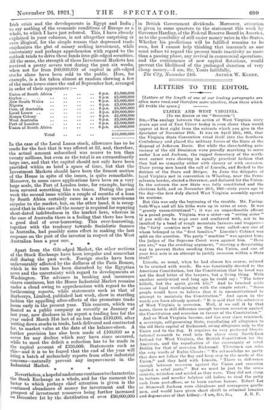LETTERS TO THE EDITOR.
[Letters of the length of one of our leading paragraphs are often more read,and therefore more effective, than those which fill treble the space.] ULSTER AND WEST VIRGINIA. (To THE EDITOR OP THE " SPECTATOlt."1 Snx,—The analogy between the action of West Virginia sixty years ago and of East Ulster to-day is even closer than would appear at first sight from the extracts which you give in the Spectator of November 19th. It was on April 25th, 1861, that the Virginia State Convention voted itself into the Southern Confederacy and placed the military forces of the State at the disposal of Jefferson Davis. But while the slave-holding aris- tocracy of the old Dominion were proudly marching to servo under Lee and Jackson, the rugged democracy of tho north- west corner were showing in equally practical fashion that they had no sympathy either with slavery or with secession. Their young men heard the call of Lincoln, and flocked to the defence of the Stars and Stripes. In Juno the delegates of loyal Virginia met in convention in Wheeling, near the Penn- sylvania border, elected a Governor, and declared for the Union. In the autumn the now State was fully constituted and the elections held, and on November 26th, 1861—sixty years ago to the day—the first duly elected West Virginia assembly opened its sessions.
But this was only the beginning of the trouble. Mr. Facing- both-Ways and all his tribe were up in arms at once. It was " grossly unconstitutional"; it was an unpardonable affront to a proud people. Virginia was a sister—an " erring sister " if you will—to be wept over and conferred with, not to bo insulted by a band of rough mountain farmers and trappers— the "forty counties men" as they were called—not one of whom belonged to the "first families." Lincoln's Cabinet was split on the question. The party " machine " was against him; the judges of the Supreme Court were against him. "Here you are," was the crushing argument, " starting a devastating war to prevent States seceding from the Union, and one of your first acts is an attempt to justify secession within a State itself."
Lincoln, as usual, when he had chosen his course, refused to be crushed with words. He was fanatically devoted to the American Constitution, but the Constitution that ho loved was not the dead letter of the lawyers, but a living thing. With another sorely-tried soul long ago he could say: " The letter killeth, but the spirit giveth life." And ho brushed aside reams of legal word-spinning with the simple retort: "Some people would have us believe that it is unconstitutional to attempt to maintain the Constitution." And again in the words you have already quoted : " It is said that the admission of West Virginia is secession. Well, if we call it by that name, there is still difference enough between secession against the Constitution and secession in favour of the Constitution."
And so West Virginia became, and has ever since remained, a sovereign, self-governing State, repudiating all allegiance to the old State capital of Richmond, owing allegiance only to the Union and to the flag. It requires no very profound Consti- tutional research to read into the above story North-East Ireland for West Virginia, the British Constitution for the American, and the repudiation of the sovereignty of rebel Dublin for that of secession Richmond. Ulstermen can echo the very words of Rufus Choate: " We acknowledge no party that does not follow the flag and keep step to the music of the Union," and they hold with Lincoln, " There is difference enough between secession against the Union. and secession against a rebel junta." But we must be just to the seces- sionists, mistaken and misled as they were. They did not stoop to torture and murder helpless old ladies, to steal the petty cash from post-offices, or to burn custom houses. Robert Let or Stonewall Jackson were chivalrous and courageous gentle- men, and would have given short shrift to criminal lunatics and degenerates of that kidney.—I am, Sir, &c., J. B. P.










































 Previous page
Previous page